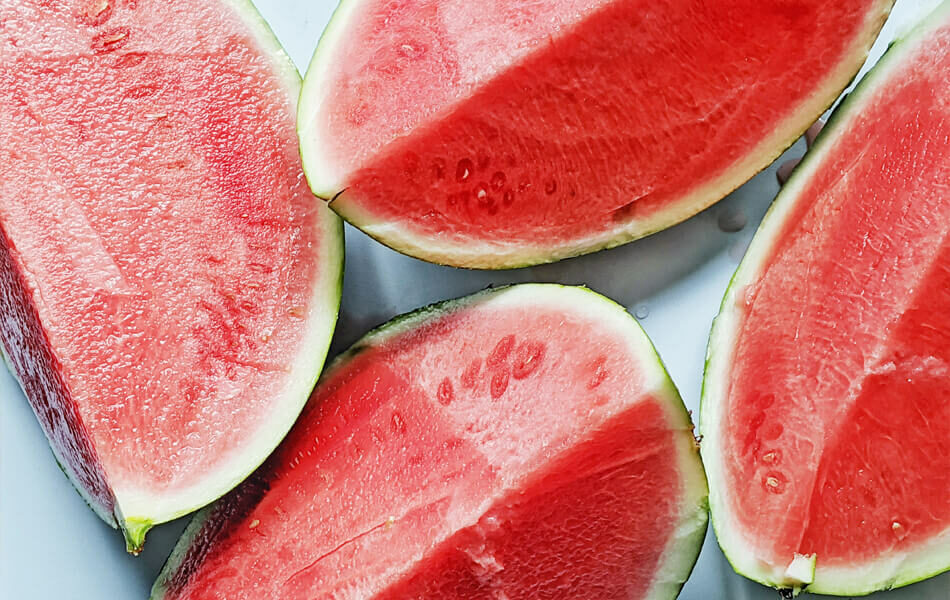Is Watermelon Good for Diabetes or Should It Be Avoided?
Have you ever met someone who doesn’t love watermelon on a summer afternoon? Us neither. But watermelon contains lots of natural sugar. This begs the question of whether people with diabetes can eat watermelon, and, if so, how much watermelon they can safely eat.

Those who have diabetes have to be very careful about what they choose to eat so they can maintain normal blood glucose levels. A diet that is high in vegetables and fruit can assist in supporting and managing blood glucose levels.
Fruit contains carbohydrates and natural sugars, so those who have diabetes need to know what the correct portion is. Although watermelon is made up of 92% water, this does not mean they can have as much as they want.
Below, we are going to have a look at the pros and cons of eating watermelon and discuss what those with diabetes need to consider before they add watermelon into their diets. Let’s take a look.
Watermelon Glycemic Index
Watermelon has a glycemic index (GI) of 72. But what does this mean? GI plays a vital role in how quickly different foods affect your blood glucose levels.
GI measures the speed at which sugars from food or drinks enter your bloodstream. If it is quick, a person will have a blood sugar spike. The glycemic index system gives all foods a score from 0 to 100. The higher the GI, the faster the sugar enters your bloodstream.
So, with a GI of 72, watermelon is considered a high glycemic index food, which is any food with a GI of 70 or more. But that’s not the end of it, as it is not that simple. Watermelon has a high water percentage, which gives it a low glycemic load of only 5 in a 7oz (200g) serving.
A low glycemic load means that while watermelon may be high in natural sugars, it will not cause an immediate spike in blood glucose levels and can be safely consumed by people with diabetes.
This means that eating a normal portion of watermelon will not likely cause you any issues and can form part of a healthy and nutritious diet. However, the same cannot be said for watermelon juice, which has a considerably higher glycemic load, just like other fruit juices.
Additionally, when eating watermelon, people with diabetes should also eat foods rich in fiber, healthy fats, and protein, like seeds and nuts. The combination of these nutrients assists with feeling fuller for longer while slowing sugar absorption into the bloodstream.
Is Watermelon Good for Diabetes?
Yes, according to the American Diabetes Association, watermelon can be good for diabetes in the correct amounts. Watermelon offers many health benefits, whether eating fruit fresh or opting for canned or frozen fruit.
Raw, unprocessed watermelon is great to cool you down and makes a healthy snack. There are many ways to enjoy watermelon, and the internet can be a great source of healthy, diabetes-friendly recipes. These can add some variation to your diet and the way in which you consume your fruits like watermelon.
However, it is important to remember that canned fruit and fruit juice contains considerably more sugar than fresh or frozen watermelon and should be approached cautiously. Always check the nutritional information printed on the food label of any canned goods before purchasing and consuming.
Before you consider using watermelon in a fruit salad, always consider the glycemic index of the fruits you are using. Watermelon has a fairly high GI score and should only be paired with fruits on the lower end of the scale. These include fresh or frozen berries, cucumber, pears, apples, and kiwis.
How much sugar is in watermelon?
The watermelon’s average portion, measured at 100g, contains 6.2g of sugar. This total amount is made of the following sugars:
- Glucose – 1.58g
- Sucrose – 1.21g
- Fructose – 3.36g
- Lactose – 0g
- Maltose – 0.06g
- Galactose – 0g
Looking at individual sugars might be beneficial when calculating glycemic index and glycemic load, and most food labels will have the breakdown available. Study these carefully when choosing any foods, and always ensure the foods have a low GI score. Different sugars have different effects on the body.
The sugar with the highest concentration is fructose, at 3.36g, making up half the total sugar count in a 100g serving of raw watermelon. Fructose is even more harmful than glucose and should be consumed in moderation and with extreme caution for people with diabetes.
While these numbers might seem excessive, a person with diabetes can safely consume 120g of watermelon per serving. If you include watermelon as a part of your main meal, consider lowering the portion size to keep the overall GI score of the meal as low as possible.
A dietitian or doctor can help you put together a specialized eating plan that will not cause significant increases in blood glucose levels, putting a person with diabetes at risk of a coma or, if untreated, death.
Does Watermelon Raise Blood Sugar?
For those with diabetes, consuming sugary foods and drinks can raise blood sugar levels considerably. Watermelon, however, is one of those fruits on the safe list of things to eat and will not cause a significant spike in blood sugar levels.
Portion sizes should be kept small. As with most foods, moderation is key. Fresh watermelon is also much healthier than canned watermelon and should be the preferred choice.
While watermelon does have a high glycemic index compared to other fresh fruits, it has a lower glycemic load and will not cause an immediate spike.
How Much Watermelon Should a Person With Diabetes Eat?
Watermelon is one of the healthier options for people with diabetes and can be enjoyed as a snack on a hot sunny day or as part of a fruit salad. It is made up of roughly 70–80% water and contains lower sugar levels than many fruits.
A portion size of watermelon should not exceed more than 200g at the most. Cut it into cubes, scoop it into cute little balls, or enjoy a juicy slice as long as it does not exceed the maximum amount of 200g.
You can avoid taking vitamin dietary supplements while easily maintaining optimal body weight when you consume watermelon. Plus, it is a refreshing summer fruit – cold watermelon is one of the most cooling and hydrating fruits around!
You can also make watermelon rind marmalade or jam as an alternative to store-bought jams that are high in sugars.
Alternatives to Watermelon
While we should all aim to eat a nutritious, balanced diet that consists of a large proportion of vegetables and fruits, this is even more important for people with diabetes and those suffering from diabetes-related complications.
Fruits have natural sugars, so people with diabetes need to monitor their fruit intake, but the fruit is also often high in fiber, vitamin C, and healthy carbohydrates. Plus, pairing fruit with protein and healthy fats can help you prevent spikes in blood sugar levels. These health benefits can’t be ignored.
If you find that watermelon is causing you too many blood sugar spikes, we have a few other fruit options that are high in vitamins (including vitamin C), minerals, and nutrients. Here are some of the best lower GI fruits to include in your diet:
- Oranges (GI score = 52)
- Berries (GI score = 25 to 53)
- Kiwis (GI score = 38 to 55)
- Grapefruit (GI score = 25)
- Peaches (GI score = 42)
- Pears (GI score = 20 to 49)
- Apples (GI score = 28 to 44)
While these fruits may be lower on the glycemic index scale, you should still monitor your intake of them if you have diabetes. A low glycemic index might not necessarily mean that the fruit has a low glycemic load and should be consumed in moderation.
Fruits with a high glycemic load can cause blood sugar levels to spike immediately, putting the person with diabetes at risk of a diabetic coma, as the sugars cause a “system shutdown” due to overload.
A Word From Our Nutritionist
Currently, no scientific evidence suggests that people with diabetes should avoid consuming watermelon. It is recommended that watermelon is included as part of a healthy diet. Containing very little sugar, only 6.2g per 100g serving, it is a great snack idea and can be enjoyed with nuts and other fruits – or on its own.
Watermelon has a higher GI score than other fruits and vegetables but can safely be added to a larger meal or enjoyed as a snack between meals to keep glucose levels constant. Eating it in its raw form is best, and processed watermelons should be avoided completely due to the sugars used during processing.
If you are following a low-sugar diet, finding foods that create a balanced meal can be tough. But adding fresh fruit and vegetables to each meal will help maintain your blood glucose levels.
Conclusion
As the old adage goes – everything in moderation. Watermelon is a tasty fruit completely safe for those with diabetes when they eat a moderate portion and pair it with other foods that are high in fiber, protein, and healthy fats.
Like most fresh fruit, watermelon is higher on the glycemic index scale, it has a very low glycemic load, so it will not have a massive effect on your blood sugar levels. Plus, it will not cause any immediate spikes that will cause concern or a medical emergency.

















































 Select your language:
Select your language: 








